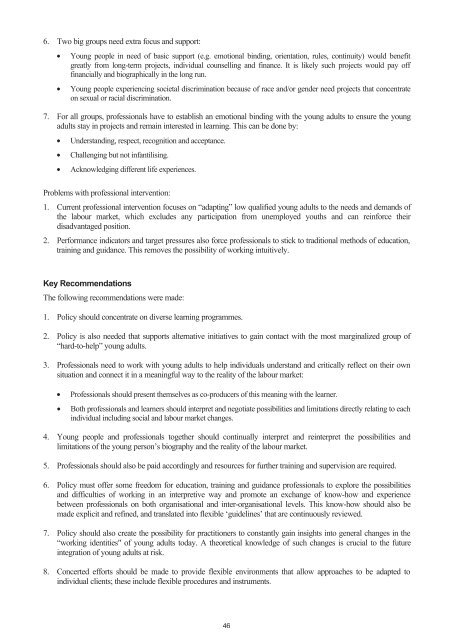briefing papers for policy makers
briefing papers for policy makers
briefing papers for policy makers
You also want an ePaper? Increase the reach of your titles
YUMPU automatically turns print PDFs into web optimized ePapers that Google loves.
6. Two big groups need extra focus and support:<br />
• Young people in need of basic support (e.g. emotional binding, orientation, rules, continuity) would benefit<br />
greatly from long-term projects, individual counselling and finance. It is likely such projects would pay off<br />
financially and biographically in the long run.<br />
• Young people experiencing societal discrimination because of race and/or gender need projects that concentrate<br />
on sexual or racial discrimination.<br />
7. For all groups, professionals have to establish an emotional binding with the young adults to ensure the young<br />
adults stay in projects and remain interested in learning. This can be done by:<br />
• Understanding, respect, recognition and acceptance.<br />
• Challenging but not infantilising.<br />
• Acknowledging different life experiences.<br />
Problems with professional intervention:<br />
1. Current professional intervention focuses on “adapting” low qualified young adults to the needs and demands of<br />
the labour market, which excludes any participation from unemployed youths and can rein<strong>for</strong>ce their<br />
disadvantaged position.<br />
2. Per<strong>for</strong>mance indicators and target pressures also <strong>for</strong>ce professionals to stick to traditional methods of education,<br />
training and guidance. This removes the possibility of working intuitively.<br />
Key Recommendations<br />
The following recommendations were made:<br />
1. Policy should concentrate on diverse learning programmes.<br />
2. Policy is also needed that supports alternative initiatives to gain contact with the most marginalized group of<br />
“hard-to-help” young adults.<br />
3. Professionals need to work with young adults to help individuals understand and critically reflect on their own<br />
situation and connect it in a meaningful way to the reality of the labour market:<br />
• Professionals should present themselves as co-producers of this meaning with the learner.<br />
• Both professionals and learners should interpret and negotiate possibilities and limitations directly relating to each<br />
individual including social and labour market changes.<br />
4. Young people and professionals together should continually interpret and reinterpret the possibilities and<br />
limitations of the young person’s biography and the reality of the labour market.<br />
5. Professionals should also be paid accordingly and resources <strong>for</strong> further training and supervision are required.<br />
6. Policy must offer some freedom <strong>for</strong> education, training and guidance professionals to explore the possibilities<br />
and difficulties of working in an interpretive way and promote an exchange of know-how and experience<br />
between professionals on both organisational and inter-organisational levels. This know-how should also be<br />
made explicit and refined, and translated into flexible ‘guidelines’ that are continuously reviewed.<br />
7. Policy should also create the possibility <strong>for</strong> practitioners to constantly gain insights into general changes in the<br />
“working identities" of young adults today. A theoretical knowledge of such changes is crucial to the future<br />
integration of young adults at risk.<br />
8. Concerted ef<strong>for</strong>ts should be made to provide flexible environments that allow approaches to be adapted to<br />
individual clients; these include flexible procedures and instruments.<br />
46


